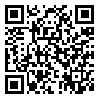BibTeX | RIS | EndNote | Medlars | ProCite | Reference Manager | RefWorks
Send citation to:
URL: http://jdisabilstud.org/article-1-2487-en.html
2- Assistant Professor in Psychology Department, Bushehr Branch, Islamic Azad University, Bushehr, Iran
3- Assistant Professor in Psychology Department, Bushehr Branch, Islamic Azad University, Bushehr, Iran; Assistant Professor in Psychology Department, Islamic Azad University and Payam Noor University, Bushehr, Iran
Abstract
Background & Objectives: Undoubtedly, the birth and presence of an Autism Spectrum Disorder (ASD) child in any family is an unpleasant and challenging event and prevents the performing of the parent's normal functions. Mothers of children with special needs, especially ASD, experience more psychological problems. There is much evidence that mothers of these children experience higher levels of general anxiety than mothers of other exceptional children. Frustration and deprivation due to the child's abnormality cause isolation, disinterest in relating to the environment, low self-esteem, a feeling of worthlessness, and low parenting self-efficacy. Eventually, this situation causes depression and endangers the mother's mental health. The present research aimed to compare the effectiveness of acceptance and commitment therapy with coping strategies training on increasing self-esteem and parenting self-efficacy in mothers of ASD children.
Methods: The quasi-experimental study has a pretest-posttest and follow-up design with a control group. The study population consisted of all mothers whose children were treated and educated in ASD education centers in Booshehr City, Iran. In total, 30 willing and volunteered to participate in the study were selected and randomly assigned to three groups (acceptance and commitment therapy, coping strategies training, and control group, each group was 10 people). The experimental groups participated in 8 sessions once a week for eight continuous weeks, while the control group did not receive treatment. The inclusion criteria included not having severe physical illness and maternal psychosis, having a child with ASD being treated and studying in one of the educational centers for children with autism, and having at least primary education for mothers. The exclusion criteria were the symptoms of mental disorder during the training session, and receiving psychiatric treatment and, having a history of receiving cognitive-behavioral training, absence from two or more sessions in the intervention program. The instruments for gathering required data consisted of Rosenberg Self-Esteem Scale (Rosenberg, 1965) and Parenting Self-Efficacy Scale (Dumka et al., 1996). The obtained data were analyzed at the level of descriptive statistics (frequency, percentage, mean and standard deviation) and inferential statistics (repeated measure analysis of variance and Bonferroni's post hoc test) at the significant level of 0.05 in SPSS version 16 software.
Results: Results showed that acceptance and commitment therapy and coping strategies training significantly improved mothers' self-esteem and parenting self-efficacy in the experimental groups compared to the control group (p<0.001). The effect of both interventions was significant from the pretest to the posttest (p<0.001) and from the pretest to follow-up (p<0.001). But it was not significant from the posttest to the follow-up (p>0.05). Also, no significant difference was observed between the average scores of the experimental groups in the variables of self-esteem (p=0.668) and parenting self-efficacy (p=0.056).
Conclusion: According to the study findings, both interventions are effective in increasing self-esteem and parenting self-efficacy, and there is no significant difference between the effectiveness of these two interventions. Therefore, therapists can use these two therapeutic and educational approaches, especially acceptance and commitment therapy, a new wave of cognitive-behavioral treatments.
| Rights and permissions | |
 |
This work is licensed under a Creative Commons Attribution-NonCommercial 4.0 International License. |



